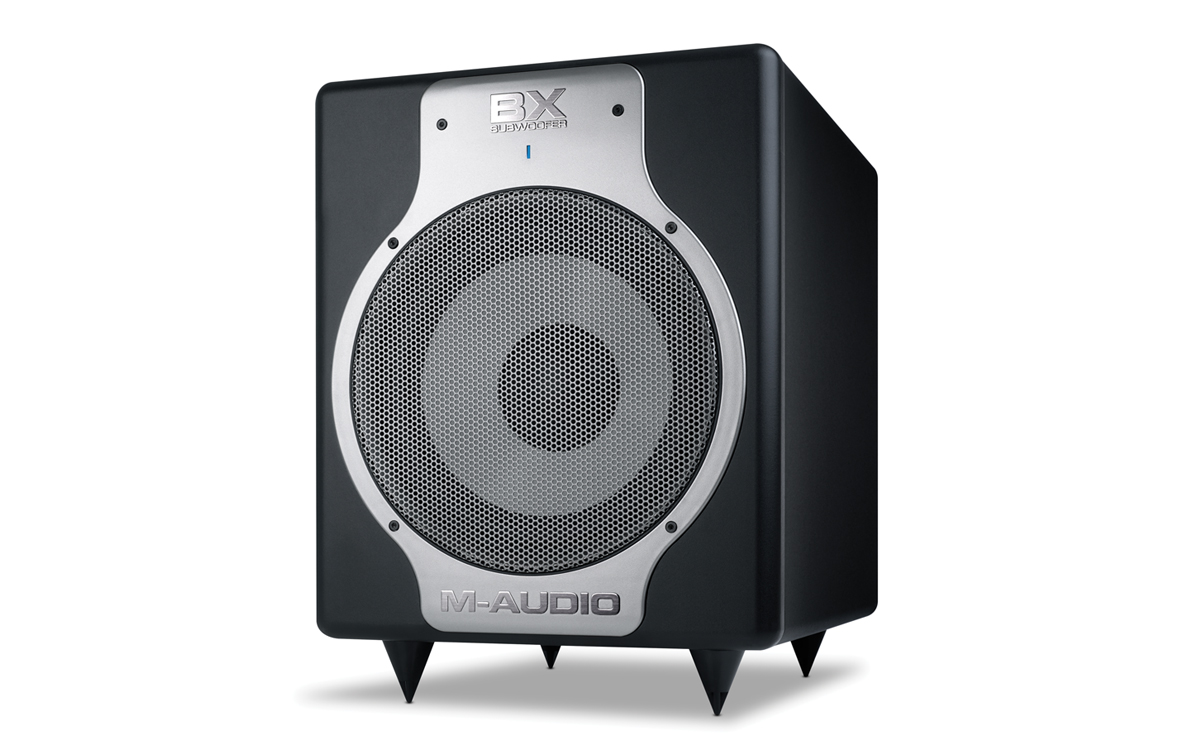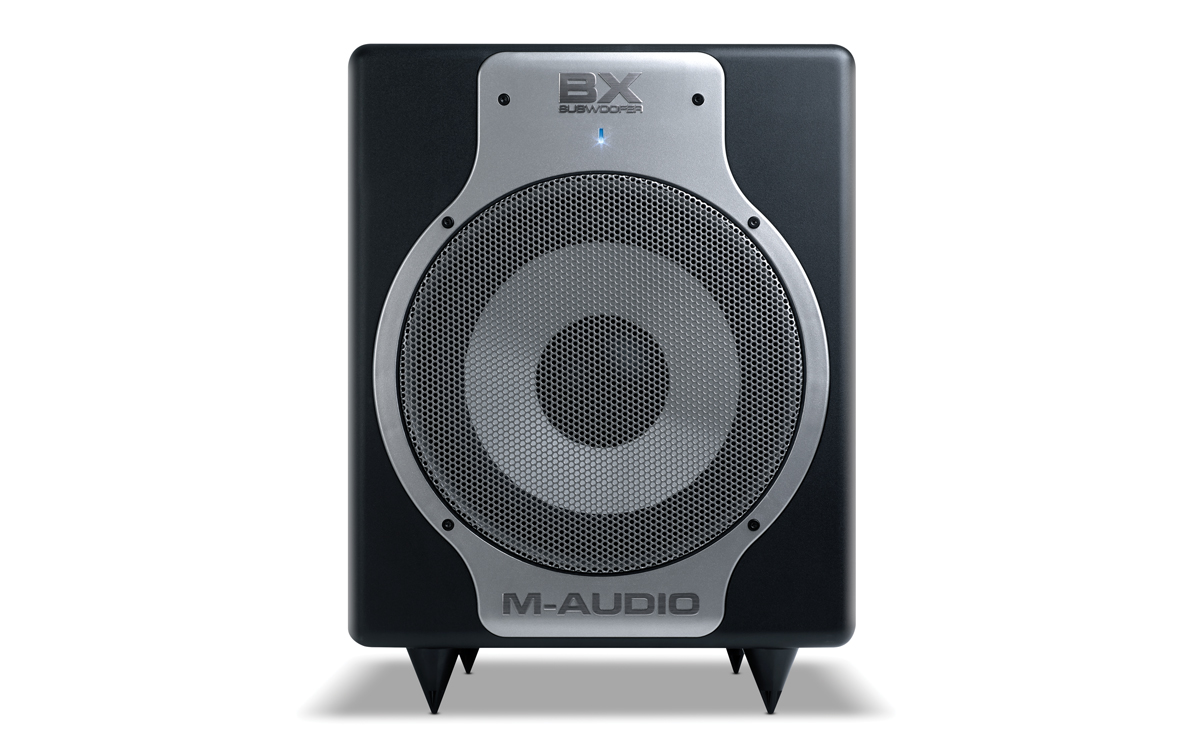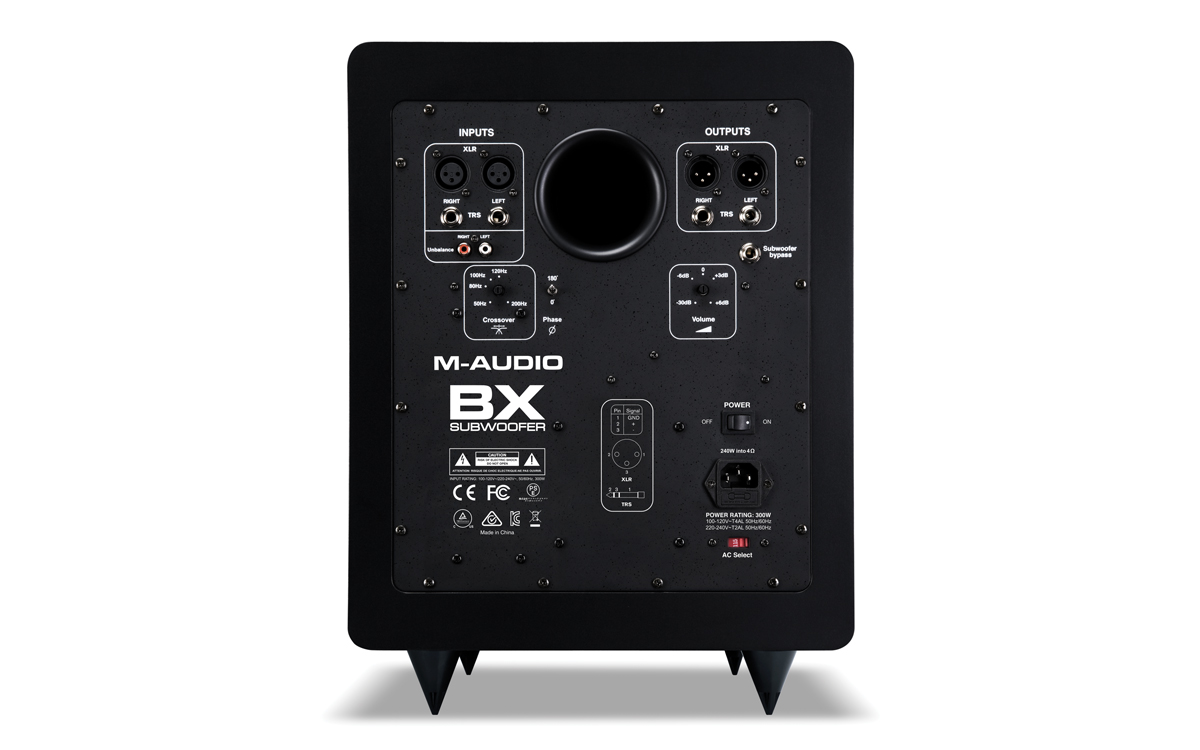BX Subwoofer
Premium Active 10" Studio Subwoofer
The BX Subwoofer delivers deep, accurate bass response down to the lowest audible frequencies, picking up where your left/right studio monitors leave off. Recording professionals know that hearing the extreme low frequencies in music is essential for making accurate mixing adjustments and producing the best recordings. The BX Subwoofer easily fulfills this requirement in a powerful and compact package that won’t take up too much of your valuable studio space.
The BX Subwoofer’s frequency response extends down to 20Hz (-3 dB), the lowest audible frequency. It uses the highest-quality components for no-compromise performance: a 10” fiberglass/paper composite driver with an oversized magnet and high-temperature 2” voice coil, powered by a 240-watt Class AB all-discrete internal amplifier with a variable 50-200 Hz crossover. The cabinet is constructed of resonant-free ¾” Medium Density Fiberboard (MDF) with 1” front and rear baffles, and is heavily braced to eliminate the extraneous cabinet vibrations that can rob a subwoofer of its impact and articulation.
However, pure acoustic performance is not the only thing that’s important to you. Therefore, we’ve focused on making the BX Subwoofer as easy to connect and convenient to use as possible.
To give it the connection and use flexibility needed to accommodate any system configuration, the BX Subwoofer has a full complement of inputs, outputs and controls.
Inputs:
Two XLR balanced/unbalanced inputs; two TRS balanced/unbalanced inputs; two unbalanced RCA inputs
Outputs:
Two XLR balanced/unbalanced outputs for satellites; two TRS balanced/unbalanced outputs for satellites
Controls:
- Volume/gain control
- Phase inverse switch for a seamless system frequency response, regardless of the subwoofer’s location in the studio
- Variable 50-200 Hz crossover control to blend perfectly with L/R monitors of all sizes
- Subwoofer bypass footswitch
You’ll find the footswitch particularly useful when you want an instantaneous comparison of how your mix sounds with and without a dedicated subwoofer.
Engineered Especially for M-Audio Monitors
Designed for use with the M-Audio M3, BX Carbon and BX D2 series, the BX Subwoofer delivers the deep bass response necessary to optimize your music, film and multimedia projects. Most of today’s personal audio systems can easily reproduce very low bass frequencies, so it’s critical that your audio production environment allows you to monitor and adjust those frequencies while you’re mixing.
The BX Subwoofer empowers you to do just that. When paired with any M-Audio studio monitor, the BX Subwoofer becomes an indispensible part of a high-performance monitoring system that provides accurate sound over the entire 20-20 kHz audible spectrum. Although we designed the BX Subwoofer with our superlative M-Audio monitors in mind, the BX sub will enhance the low-frequency performance of any brand of high-quality near-field monitor.
Don’t Strain Your Speakers—Or Your Ears
Studio monitors like our BX5 Carbon are designed to work well as full-range monitors. Yet when they are asked to reproduce extremely bass-heavy material at high volumes, it can be taxing on the speakers and fatiguing to the listener. When they’re used in tandem with the BX Subwoofer however, the system comfortably reproduces full-range signals at significantly higher levels without any audible stress.
This is because the active HP/LP crossover in the BX Subwoofer acts as a “traffic cop,” directing low frequencies to the subwoofer and only letting those frequencies above the user-chosen crossover point to go to the satellite monitors. When the satellites are relieved of the burden of trying to reproduce the deep bass with their modest 5” woofers, they can play at much louder levels with markedly lower strain and distortion. The entire system now plays cleaner, louder, and with greater detail, which means you’ll get cleaner audio information and make better mixing decisions.
Active Crossover
The BX Subwoofer accepts two-channel stereo outputs from your mixer, audio interface or sound card. Your main L/R monitors connect to the subwoofer’s outputs. As stated above, the internal crossover network of the BX Subwoofer splits the signal at a user-chosen crossover frequency ( between 50-200Hz), routing everything below to the sub and everything above the crossover point to the main L/R monitor speakers.
The very steep 4th-order HP/LP filters (24 dB/oct) significantly improve your system’s overall fidelity because they limit the amount of “overlap” between the subwoofer and the satellite, thus minimizing phase-related frequency response cancellations and other crossover-induced anomalies. This assures that each component only has to deliver frequencies to which it is ideally suited: deep bass for the BX Subwoofer, and mid-bass/midrange/treble for your near-field monitors.
The variable crossover also makes it possible to tailor the bass response in your monitoring environment in order to achieve the most accurate acoustic response—in both studio and home theater applications. For example, to minimize “localizing” on the sub (detecting the origin of the sub’s sound by ear, which destroys any semblance of a believable sonic image), you can choose a higher crossover frequency if the subwoofer is reasonably close to the L/R monitors, or a very low crossover frequency if the sub is located far away from the L/R monitors. Sound becomes more “localizable” as frequency increases, while very low bass is non-directional. Therefore, you can see how a widely-variable 50-200 Hz crossover—like in the BX Subwoofer—really opens up your system placement options.
Rock-Solid Bass Performance
Bass you can feel takes some heavy-duty power and components. That’s why the BX Subwoofer carries a hefty 240 watts average continuous of totally discrete Class AB power for tons of headroom. “Headroom” is the amount of undistorted instantaneous power an amplifier can deliver in excess of its “continuous” or “average” RMS long-term power output rating. It’s what makes one amplifier sound “louder” than another, even when both have the same power rating. Class AB amplifiers have far more headroom than Class D digital amplifiers and an AB amp can usually play much louder and cleaner than a D of the same continuous power rating.
The 10-inch driver features an oversized magnet for higher sensitivity (“efficiency”) and a high-temperature, long-throw voice coil, delivering maximum low frequency output and optimized power handling. A well-designed powered subwoofer, like the BX Subwoofer, has a driver and amplifier that are well-matched to each other. It makes no sense to have a rugged driver with long excursion and high power-handling capability if the on-board amplifier can’t exploit those attributes to maximum benefit. Likewise, it’s just as counterproductive to have a powerful amplifier with great headroom paired with a driver than can’t handle that input power and convert it into clean acoustic output. The BX Subwoofer combines a very powerful amplifier with a driver of commensurately matched power handling and long excursion to form a system of unusually capable, dynamic performance.
The cabinet is made of ¾” vinyl-clad MDF with 1” front and back baffles, serious internal bracing and a flared rear bass-reflex port to minimize audible air turbulence and optimize low frequency output. The fiberglass/paper composite driver provides exceptionally accurate bass response, resulting in deep, articulate low-frequency output that adds stunningly lifelike body and weight to any program material.
No More Mixing Guesswork
A good monitoring system allows you to create material that translates well across a variety of playback environments. As such, it’s important to know what your mixes will sound like both with and without the low-frequency extension a subwoofer provides. This is precisely why the BX Subwoofer includes a subwoofer bypass function that completely removes the subwoofer amp, speaker, and crossover from the signal path—sending the full-bandwidth program to your near-field monitors. By plugging in the included footswitch, you can control this function dynamically as you’re playing back your material—even from across the room.
The M-Audio BX Subwoofer is a crucial part of any top-flight studio. Make it part of yours.


